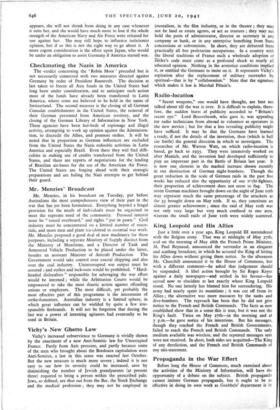King Leopold and His Allies
Just a little over a year ago, King Leopold III surrendered with the Belgian army. That was at midnight of May 27th, and on the morning of May 28th the French Prime Minister, M. Paul Reynaud, announced the surrender in an eloquent and scathing broadcast, in which he accused the King of letting his Allies down without giving them notice. In the afternoon Mr. Churchill announced it to the House of Commons, but with a different comment—he asked that judgement should be suspended. A libel action brought by Sir Roger Keyes against a daily newspaper—and settled in his favour—has served now to elucidate at last exactly where King Leopold stood. No one latterly has blamed him for surrendering. His army had nearly spent its munitions ; it was cut off from its Allies ; the alternative was more massacre by the tanks and dive-bombers. The reproach has been that he did not give notice to the French and British Commands. The facts as now established show that in a sense this is true, but it was not the King's fault. Twice on May 27th—in the morning and at 5 p.m.—he gave notice of his intentions. But his messages, though they reached the French and British Governinents, failed to reach the French and British Commands. The only medium available was wireless, and the repeated messages sent were not received. In short, both sides are acquitted—The King of any dereliction, and the French and British Commands of any mis-statement.


























 Previous page
Previous page